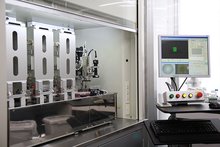LifeNet Health expands regenerative medicine efforts with opening of Research Triangle Park, N.C., facility
LifeNet Health expands regenerative medicine efforts with opening of Research Triangle Park, N.C., facility
Virginia Beach, Va. — Nov. 2, 2016 — LifeNet Health is expanding its cell-based research and processing capacity with the opening of a facility in North Carolina’s Research Triangle Park (RTP), near Durham. It will be an extension of its flagship research center, the LifeNet Health Institute of Regenerative Medicine, located at the company’s headquarters in Virginia Beach, Va.
LifeNet Health continues pioneering regenerative medicine efforts with acquisition of scaffold-free, 3D tissue bioprinter
LifeNet Health continues pioneering regenerative medicine efforts with acquisition of scaffold-free, 3D tissue bioprinter
The LifeNet Health Institute of Regenerative Medicine (IRM) is taking a step toward the future of biomedical science and tissue engineering with the installation of a robotic “bioprinter” at its primary research and development facility in Virginia Beach, Va.
Translational Research
LifeNet Health’s research is focused on regenerative medicine involving the intersection of biology, medicine, and engineering. This work is committed to revolutionizing and enhancing the ways that LifeNet Health contributes to the improved health and quality of life for millions of people worldwide by restoring, maintaining, or enhancing tissue and organ function.
Design Control
It is through the Design Control process that LifeNet Health develops and commercializes new products, as well as makes modifications or improvements to existing product designs. Its purpose is to ensure that design requirements are translated into design outputs, as well as ensures products meet applicable safety and performance criteria. This procedure establishes a set of controls to provide for a systematic assessment of the design as it progresses through the development process.
Product Development & Engineering
LifeNet Health’s Product Development and Engineering department is organized by disciplines, with each led by a Project Manager/Leader. Specific disciplines include cardiovascular, machined bone allografts for spine, sports medicine and soft tissue, and osteobiologics - including orthopedics, trauma, and dental.
Cardiovascular Research
LifeNet Health has a strong commitment to developing uses of donor tissue to meet the world’s cardiovascular needs. The goals of the Institute are to utilize the donor gift to provide life saving and life restoring tissue grafts through innovative bioengineering and giving hope to donor families and recipients.
Cardiovascular disease is the most common cause of death annually (2.5M) and the most costly disease in the U.S. - $298B/annually. Cardiac congenital anomalies are the most common birth defects in the U.S. (ref. cdc.gov)
Primary Cell Production
In today’s research market, there is a strong need to accurately recapitulate human biology and physiology in a laboratory setting. Optimized use of primary human cells enables more reliable study of the functionality and interaction of organ systems, tissues, and cells. Timely access to the highest quality tissues allows for rapid isolation of high quality primary cells for research purposes. This process is in compliance with LifeNet Health’s commitment to quality and ensures effective research that closely reflects human biology.
Tissue Recovery for Research
For over 30 years, LifeNet Health’s record as a leader in organ and tissue recovery for transplantation, and has now expanded to include tissue recovery for research. The purpose of this recovery group is to provide the gift of human organs that are not suitable for transplant, tissues, and cells to advance biomedical and pharmacological sciences. LifeNet Health’s vision for this work is to become a vertically integrated unit to procure, process, and supply human tissue based research materials.
Pagination
- Page 1
- Next page


